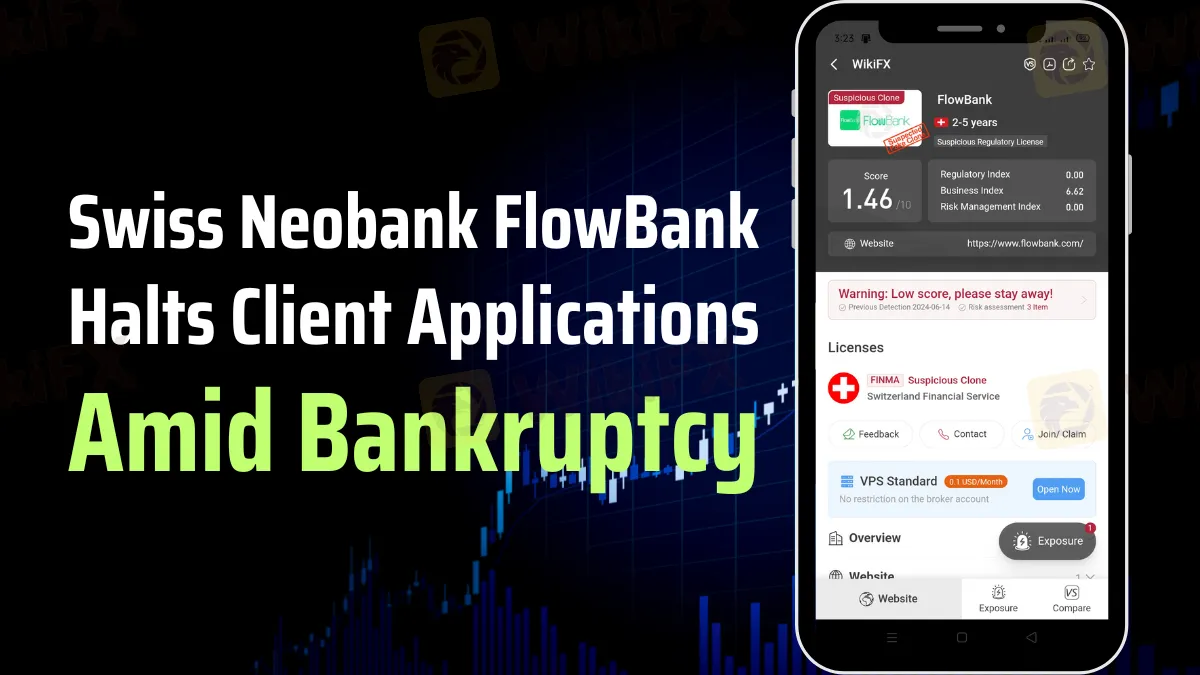简体中文
繁體中文
English
Pусский
日本語
ภาษาไทย
Tiếng Việt
Bahasa Indonesia
Español
हिन्दी
Filippiiniläinen
Français
Deutsch
Português
Türkçe
한국어
العربية
Swiss Neobank FlowBank Halts Client Applications Amid Bankruptcy
Abstract:Swiss neobank FlowBank stops new client applications and onboarding as financial regulator FINMA initiates bankruptcy proceedings.

FlowBank, a Swiss online neobank, unexpectedly ceased accepting new customer applications and stopped providing client onboarding. This comes following the announcement earlier today that the bank will be filing for bankruptcy by the Swiss financial authority, FINMA.
While FlowBank's primary website is still up and running, a maintenance notice has been added to the “Open an Account” page informing users that the onboarding procedure is now not accessible. Customers who need help opening an account can get in touch with customer support.

CEO Charles-Henri Sabet founded FlowBank in 2020, with an initial emphasis on banking and investing operations. It has, however, just changed its emphasis to online CFD trading, which was akin to Sabet's prior business endeavor, London Capital Group Ltd (LCG). The cryptocurrency investment firm CoinShares owns a sizeable 30% of FlowBank's ownership.
Concerns about FlowBank's financial stability led FINMA to decide to file the bank for bankruptcy. The regulator disclosed that FlowBank may be overindebted and no longer satisfies the minimal capital criteria required for its operations. With preliminary estimates showing that FlowBank's “privileged deposits” may be completely reimbursed from the bank's available cash, this step seeks to safeguard depositors.

It's still unclear how FlowBank's insolvency would affect LCG, a subsidiary. Despite not having submitted its 2022 financial accounts—which are late by over six months—LCG is purportedly in good standing and has a separate license from the UK's Financial Conduct Authority (FCA).
The group also comprises LCG Capital Markets Limited, an offshore company based in the Bahamas, and London Capital Group (Cyprus) Ltd, a company whose CySEC license was revoked in 2021.
The demise of FlowBank is the second big blow to neobrokers in Europe in less than a year. Due to ongoing losses, Amsterdam-based BUX was sold to ABN Amro in the latter part of last year. The demise of FlowBank highlights the financial risks that may occur in the quickly changing digital banking ecosystem and adds to the expanding list of issues affecting the neobank industry.
Stakeholders and customers are waiting for more information as it develops on FlowBank's bankruptcy procedures and the implications for the neobanking sector as a whole.
You may also access the latest news in the financial market here.

Disclaimer:
The views in this article only represent the author's personal views, and do not constitute investment advice on this platform. This platform does not guarantee the accuracy, completeness and timeliness of the information in the article, and will not be liable for any loss caused by the use of or reliance on the information in the article.
Read more

Investing Capital in Focus as Complaints on Withdrawal and Other Issues Mount
Explore this guide we have exposed Investing Capital, which has mounted concerns for traders by disallowing withdrawals and making them lose their hard-earned money.

Global Brokers Vs. Indian Rules: Why They Struggle in India
RBI issued a warning last year against 75 forex brokers. Those brokers are globally popular and regulated in other countries, but they are banned in India. Only few brokers even have physical offices located in India. So, why do global brokers face so many challenges in entering the Indian market?

Aetos: A Closer Look at Its Licenses
With multiple regulatory entries and one license now revoked, Aetos stands as a broker requiring closer scrutiny from investors, particularly those prioritizing license scope and jurisdictional compliance.

APX Prime: No Regulation, No Withdrawals? A Closer Look at the Red Flags
With no valid license, a questionable registration in Saint Vincent and the Grenadines, and unresolved client complaints, APX Prime presents risks that traders cannot afford to ignore.
WikiFX Broker
Latest News
Tokenized Stocks: Innovation or Just Another Wrapper?
XTB Launches Tax-Advantaged Retirement Accounts in Poland
Zaffex Broker Review
ECB Ends Easing Cycle, But The Eurozone Crisis Is Just Beginning
Amazon deploys its 1 millionth robot in a sign of more job automation
Gold Rush Again: What's Driving the Bullion Market Crazy Ahead of US Jobs Data?
10-year Treasury yield remains higher despite weak ADP jobs report
Blueberry Markets Revamps its Website
The private sector lost 33,000 jobs in June, badly missing expectations for a 100,000 increase, ADP says
MT4 and MT5 Platforms - Helping Traders Up Their Forex Trading Game
Currency Calculator


